Unit 1 Advertising Grammar and usage直接引语与间接引语课件(25张)
文档属性
| 名称 | Unit 1 Advertising Grammar and usage直接引语与间接引语课件(25张) |
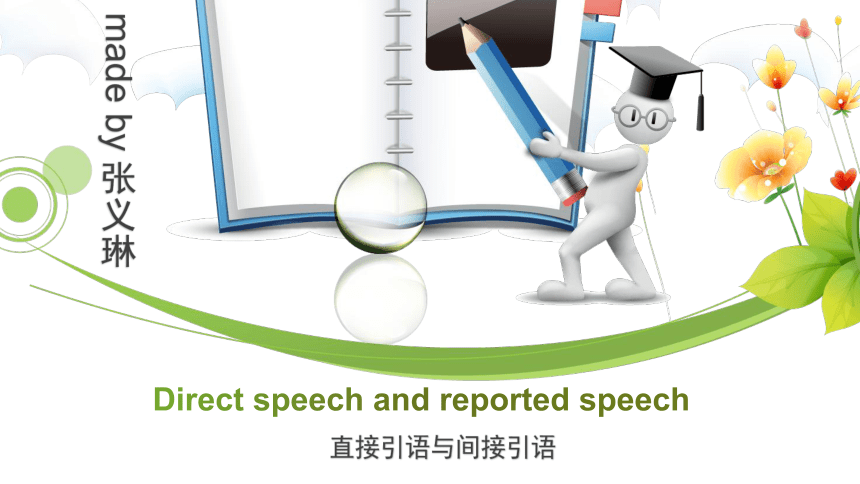
|
|
| 格式 | zip | ||
| 文件大小 | 2.2MB | ||
| 资源类型 | 教案 | ||
| 版本资源 | 牛津译林版 | ||
| 科目 | 英语 | ||
| 更新时间 | 2019-07-25 00:00:00 | ||
图片预览

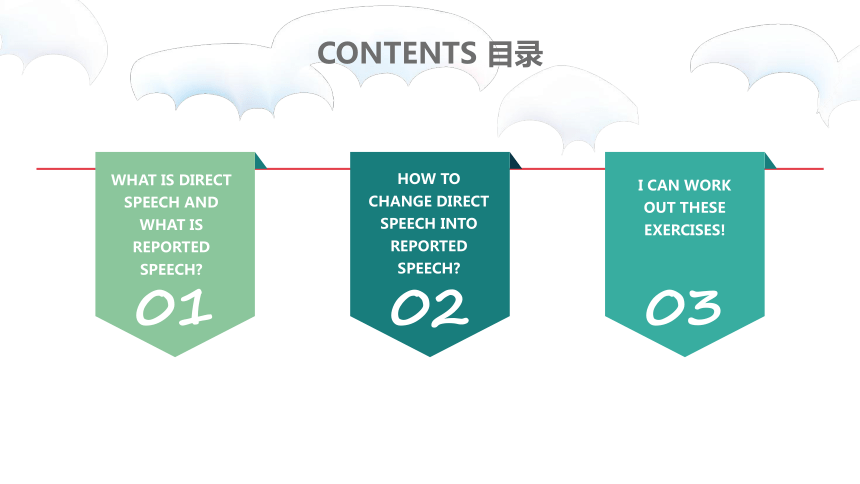
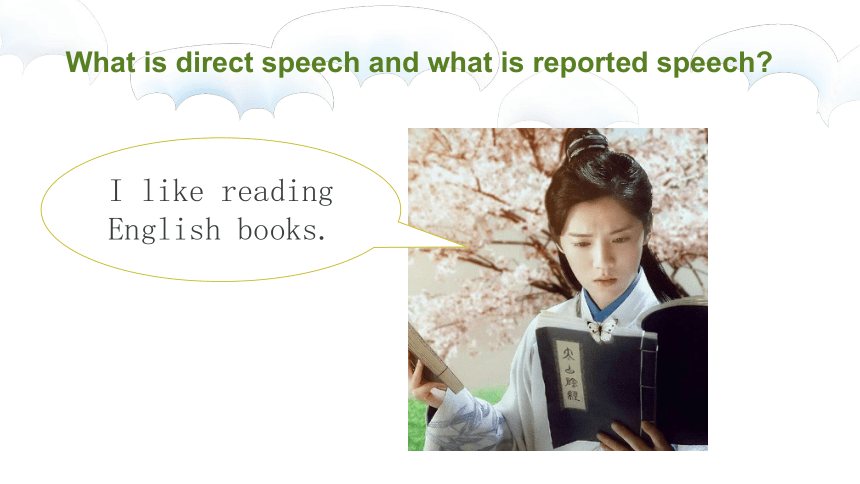
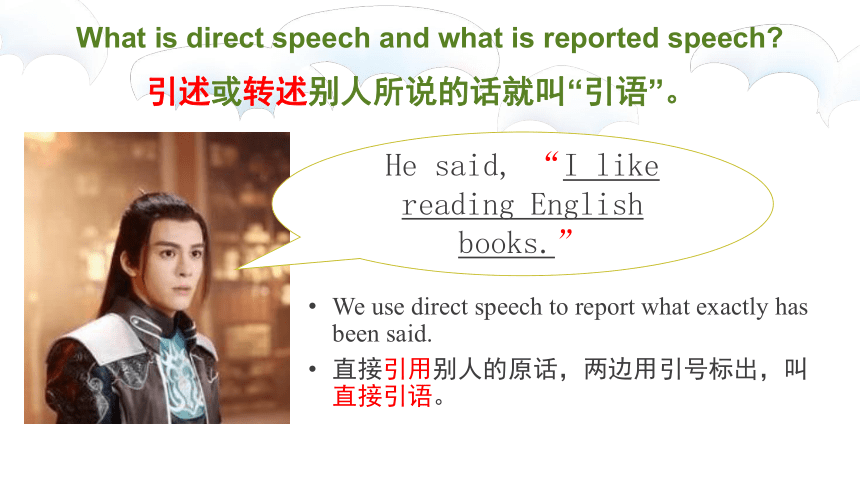


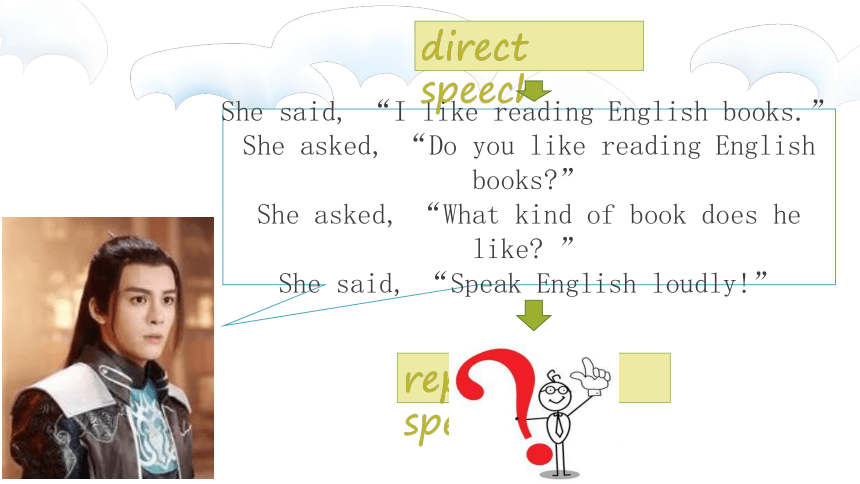
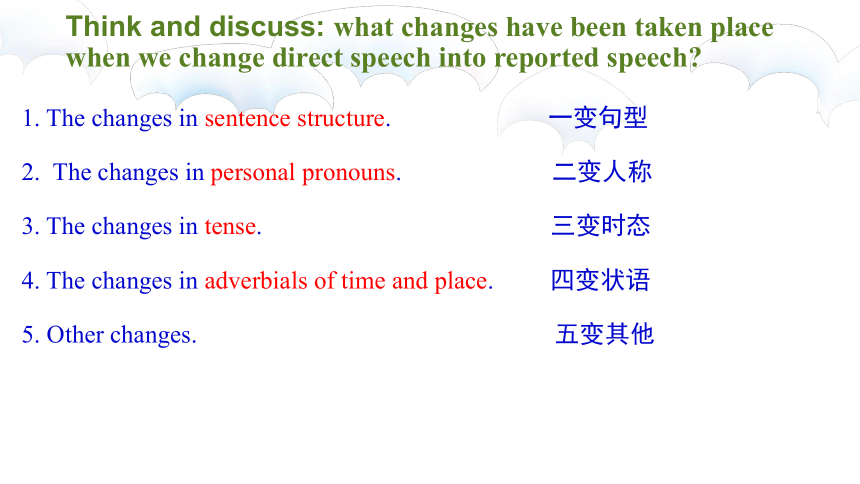
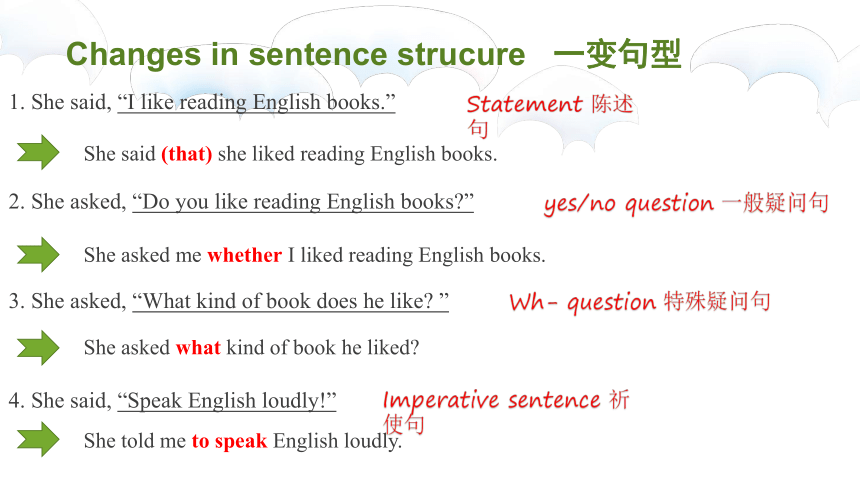
文档简介
课件25张PPT。Direct speech and reported speech直接引语与间接引语made by 张义琳contents 目录What is direct speech and what is reported speech?What is direct speech and what is reported speech? I like reading English books.引述或转述别人所说的话就叫“引语”。He said, “I like reading English books.”We use direct speech to report what exactly has been said.
直接引用别人的原话,两边用引号标出,叫直接引语。
What is direct speech and what is reported speech? 引述或转述别人所说的话就叫“引语”。He said that he liked reading English books.We can use reported speech to report what has been said without using exact words.
用自己的话转述别人的话,不需要引号的,则是间接引语。
What is direct speech and what is reported speech? How to change direct speech into reported speech? I like reading English books.
Do you like reading English books?
What kind of book does he like?
Speak English loudly!She said, “I like reading English books.”
She asked, “Do you like reading English books?”
She asked, “What kind of book does he like? ”
She said, “Speak English loudly!”direct speechreported speechThink and discuss: what changes have been taken place when we change direct speech into reported speech? 1. The changes in sentence structure. 一变句型
2. The changes in personal pronouns. 二变人称
3. The changes in tense. 三变时态
4. The changes in adverbials of time and place. 四变状语
5. Other changes. 五变其他
1. She said, “I like reading English books.”
2. She asked, “Do you like reading English books?”
3. She asked, “What kind of book does he like? ”
4. She said, “Speak English loudly!”
Statement 陈述句 yes/no question 一般疑问句Wh- question 特殊疑问句 Imperative sentence 祈使句She said (that) she liked reading English books.She asked me whether I liked reading English books.She asked what kind of book he liked?She told me to speak English loudly.Changes in sentence strucure 一变句型Changes in sentence strucure 一变句型直接引语是陈述句:间接引语变成由 that 引导的宾语从句。
直接引语是一般疑问句:间接引语变成由 whether/if 引导的宾语从句。
直接引语是特殊疑问句:间接引语变成由 特殊疑问词 引导的宾语从句。
直接引语是祈使句:间接引语变成由 不定式 引导的不定式短语。
理解了嘛?EXERCISE 11. She said, “ They are using PSAs to educate people. ”
She said they were using PSAs to educate people.
2. Liu Fang asked, “ Is it easy to use? ”
Liu Fang asked it was easy to use.
3. Zhang Lin asked, “How can it help me remember English words? ”
Zhang Lin asked me it could help him remember English words.
4. “Don't smoke here!,” the young woman said.
The young woman told me smoke there.(that)whetherifhownot to1. She said, “I like reading English books.”
2. She asked (me), “Do you like reading English books?”
3. She asked, “What kind of book does he like? ”
She said (that) she liked reading English books.She asked me whether I liked reading English books.She asked what kind of book he liked?Changes in personal pronoun 二变人称Changes in personal pronoun 二变人称直接引语的主语是 第一人称,间接引语句中人称变成 与 主句主语一致的人称。
直接引语的主语是 第二人称,间接引语句中人称变成 与 主句逻辑宾语一致的人称。
直接引语的主语是 第三人称,间接引语句中人称保持不变。一主、二宾、三不变要记住哦!EXERCISE 21. The girl said, “ I want to learn English well. ”
She said that wanted to learn English well.
2. Liu Fang asked, “ where are you going. ”
Liu Fang asked where was going.
3. Zhang Lin said, “ they will go to school by bus. ”
Zhang Lin said that would go to school by bus.
sheIthey1. She said, “ This trick is very clever.”
She said (that) that trick was very clever.
2. Tom said , “ I did some research last week.”
Tom said that he had done some research the week before.”
3. Zhang Lin said, “ I am doing my homework now. ”
Zhang Lin said that he was doing his homework then.
Changes in tense 三变时态Changes in tense 三变时态理解加记忆,我就能无敌!一般现在时→一般过去时 现在进行时→过去进行时
do/does → did am/is/are doing → was/were doing
一般将来时→过去将来时 现在完成时→过去完成时
will do → would do have/has done→had done
一般过去时→过去完成时 过去完成时→过去完成时
did → had done had done → had doneEXERCISE 31. She said, “ I have met Ann here two days ago. ”
She said that she Ann there two days before. .
2. She said, “ This trick is very clever.”
She said (that) that trick very clever.
3. He said, “Light travels at great speed.”
He said that light at great speed.
travels注意:如果所陈述的内容是一个不会随着时间推移而发生变化的事实时,从句时态可不用变化。had metwasChanges in adverbials of time and place 四变状语时间状语
now → then
today → that day
yesterday → the day before
tomorrow → the next day
last week → the week before two days ago → two days before 地点状语
here → there
读一读,记一记呗!EXERCISE 41. She said, “ I did some research last week. ”
She said that she had done some research .
2. Tom said, “ I am working here today.”
Tom said that he was working .
3. Miss Wang said, “ they will arrive at school tomorrow.”
Miss Wang said that they would arrive at school .the next daytherethe week beforethat day指示代词
this → that
these → thoseOther changes 五变其他动词
come → go
bring → take
must → had to
can → could
may → might这些也要记一记呢!1. The changes in sentence structure. 一变句型
2. The changes in personal pronouns. 二变人称
3. The changes in tense. 三变时态
4. The changes in adverbials of time and place. 四变状语
5. Other changes. 五变其他
conclusion1. The changes in sentence structure.
2. The changes in personal pronouns.
3. The changes in tense.
4. The changes in adverbials of time and place.
5. Other changes.
直接引语变为宾语从句或者动词不定式短语。一主、二宾、三不变。一般现在时→一般过去时 现在进行时→过去进行时
一般将来时→过去将来时 现在完成时→过去完成时
一般过去时→过去完成时 过去完成时→过去完成时now→then today→that day here→there
yesterday→the day before last week→the week before tomorrow→the next day two days before→two days ago this→that these→those
come→go bring→take
can→could must→had toconclusion1. I asked him how much______.
A. does his new car cost B. did hid new car cost
C. his new car cost D. his new car does cost
2. Do you know ______ now?
A. what he's looking for B. what is he looking for
C. what does he look for D. what he looks for
3. The teacher told us______so much noise when people were speaking.
A. don't make B. not make
C. not making D. not to make
4. He didn't know_____ he should go or not.
A. where B. what C. that D. whether
EXERCISE 5都做对的,本王有赏!Homeworkworkbook: page 92THANKS
直接引用别人的原话,两边用引号标出,叫直接引语。
What is direct speech and what is reported speech? 引述或转述别人所说的话就叫“引语”。He said that he liked reading English books.We can use reported speech to report what has been said without using exact words.
用自己的话转述别人的话,不需要引号的,则是间接引语。
What is direct speech and what is reported speech? How to change direct speech into reported speech? I like reading English books.
Do you like reading English books?
What kind of book does he like?
Speak English loudly!She said, “I like reading English books.”
She asked, “Do you like reading English books?”
She asked, “What kind of book does he like? ”
She said, “Speak English loudly!”direct speechreported speechThink and discuss: what changes have been taken place when we change direct speech into reported speech? 1. The changes in sentence structure. 一变句型
2. The changes in personal pronouns. 二变人称
3. The changes in tense. 三变时态
4. The changes in adverbials of time and place. 四变状语
5. Other changes. 五变其他
1. She said, “I like reading English books.”
2. She asked, “Do you like reading English books?”
3. She asked, “What kind of book does he like? ”
4. She said, “Speak English loudly!”
Statement 陈述句 yes/no question 一般疑问句Wh- question 特殊疑问句 Imperative sentence 祈使句She said (that) she liked reading English books.She asked me whether I liked reading English books.She asked what kind of book he liked?She told me to speak English loudly.Changes in sentence strucure 一变句型Changes in sentence strucure 一变句型直接引语是陈述句:间接引语变成由 that 引导的宾语从句。
直接引语是一般疑问句:间接引语变成由 whether/if 引导的宾语从句。
直接引语是特殊疑问句:间接引语变成由 特殊疑问词 引导的宾语从句。
直接引语是祈使句:间接引语变成由 不定式 引导的不定式短语。
理解了嘛?EXERCISE 11. She said, “ They are using PSAs to educate people. ”
She said they were using PSAs to educate people.
2. Liu Fang asked, “ Is it easy to use? ”
Liu Fang asked it was easy to use.
3. Zhang Lin asked, “How can it help me remember English words? ”
Zhang Lin asked me it could help him remember English words.
4. “Don't smoke here!,” the young woman said.
The young woman told me smoke there.(that)whetherifhownot to1. She said, “I like reading English books.”
2. She asked (me), “Do you like reading English books?”
3. She asked, “What kind of book does he like? ”
She said (that) she liked reading English books.She asked me whether I liked reading English books.She asked what kind of book he liked?Changes in personal pronoun 二变人称Changes in personal pronoun 二变人称直接引语的主语是 第一人称,间接引语句中人称变成 与 主句主语一致的人称。
直接引语的主语是 第二人称,间接引语句中人称变成 与 主句逻辑宾语一致的人称。
直接引语的主语是 第三人称,间接引语句中人称保持不变。一主、二宾、三不变要记住哦!EXERCISE 21. The girl said, “ I want to learn English well. ”
She said that wanted to learn English well.
2. Liu Fang asked, “ where are you going. ”
Liu Fang asked where was going.
3. Zhang Lin said, “ they will go to school by bus. ”
Zhang Lin said that would go to school by bus.
sheIthey1. She said, “ This trick is very clever.”
She said (that) that trick was very clever.
2. Tom said , “ I did some research last week.”
Tom said that he had done some research the week before.”
3. Zhang Lin said, “ I am doing my homework now. ”
Zhang Lin said that he was doing his homework then.
Changes in tense 三变时态Changes in tense 三变时态理解加记忆,我就能无敌!一般现在时→一般过去时 现在进行时→过去进行时
do/does → did am/is/are doing → was/were doing
一般将来时→过去将来时 现在完成时→过去完成时
will do → would do have/has done→had done
一般过去时→过去完成时 过去完成时→过去完成时
did → had done had done → had doneEXERCISE 31. She said, “ I have met Ann here two days ago. ”
She said that she Ann there two days before. .
2. She said, “ This trick is very clever.”
She said (that) that trick very clever.
3. He said, “Light travels at great speed.”
He said that light at great speed.
travels注意:如果所陈述的内容是一个不会随着时间推移而发生变化的事实时,从句时态可不用变化。had metwasChanges in adverbials of time and place 四变状语时间状语
now → then
today → that day
yesterday → the day before
tomorrow → the next day
last week → the week before two days ago → two days before 地点状语
here → there
读一读,记一记呗!EXERCISE 41. She said, “ I did some research last week. ”
She said that she had done some research .
2. Tom said, “ I am working here today.”
Tom said that he was working .
3. Miss Wang said, “ they will arrive at school tomorrow.”
Miss Wang said that they would arrive at school .the next daytherethe week beforethat day指示代词
this → that
these → thoseOther changes 五变其他动词
come → go
bring → take
must → had to
can → could
may → might这些也要记一记呢!1. The changes in sentence structure. 一变句型
2. The changes in personal pronouns. 二变人称
3. The changes in tense. 三变时态
4. The changes in adverbials of time and place. 四变状语
5. Other changes. 五变其他
conclusion1. The changes in sentence structure.
2. The changes in personal pronouns.
3. The changes in tense.
4. The changes in adverbials of time and place.
5. Other changes.
直接引语变为宾语从句或者动词不定式短语。一主、二宾、三不变。一般现在时→一般过去时 现在进行时→过去进行时
一般将来时→过去将来时 现在完成时→过去完成时
一般过去时→过去完成时 过去完成时→过去完成时now→then today→that day here→there
yesterday→the day before last week→the week before tomorrow→the next day two days before→two days ago this→that these→those
come→go bring→take
can→could must→had toconclusion1. I asked him how much______.
A. does his new car cost B. did hid new car cost
C. his new car cost D. his new car does cost
2. Do you know ______ now?
A. what he's looking for B. what is he looking for
C. what does he look for D. what he looks for
3. The teacher told us______so much noise when people were speaking.
A. don't make B. not make
C. not making D. not to make
4. He didn't know_____ he should go or not.
A. where B. what C. that D. whether
EXERCISE 5都做对的,本王有赏!Homeworkworkbook: page 92THANKS
